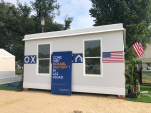Not only are home buyers interested in and desiring products that are not harmful to the environment, but they also want high-performance homes that are beneficial to their physical and psychological well-being.
Gene Myers, CEO of Thrive Home Builders, is an advocate for this trend. Myers, recently elected president of the board of directors of the Energy and Environmental Building Alliance (EEBA), offers homes in the Denver area that are not only high performance, but also attainable. This has become a difficult progression for his organization, working with both suppliers and municipalities to come to the right product at the right price.
Through the process, Myers has seen that municipalities are more receptive to high performing housing and will offer more incentives to a builder for a greener product, and for bringing urban attributes to suburban areas, like more density and walkability.
In this short video, Myers explores the various ways he’s approaching the future of design and construction, along with best practices on collaborating with municipalities.
In What’s Wrong with Housing in America? An Inconvenient Truth or the Failure to Make Choices, Scott Cox speaks to the complexity of the system. He encourages a macro-level approach, versus the micro level that so often happens. His memo states: Instead of making each project fight through years of agency review and litigation over impacts to the environment, agencies and municipalities would have to identify critical land for the environment (and deal with the “takings” issues, etc.), and at the same time identify those areas where they will support new housing 100%.
Cox also encourages municipalities to be more informed and to offer more details about the type of housing that they want built to avoid higher costs due to uncertainty or misdirection. He continues to share that project approval is so onerous that it adds to time and costs and that municipalities can offset that by being more clear with their objectives.
Some municipalities are offering tax credits in addition to a faster permitting process. However, Jeff Whiton, CEO at the Homebuilders Association of Denver, says there haven’t been many incentives for production home building even with 15 of the national builders in the jurisdiction, which all have individual green building or sustainable building programs.
“We have probably the biggest extremes in the country here,” Whiton says. “And there is no organized effort on the part of the municipalities. In Boulder, you have to do all sorts of crazy stuff to get a building permit. Average selling price in Boulder is $1.5M, that’s the only way you get a building permit. Affordability here is a huge issue. We are in the top three in year-over-year increases in home prices, outstripping income growth which is not a good situation to be in.”
At this point, the housing industry is still looking for the right mix of municipal collaboration, product, and programs that make green building profitable.


